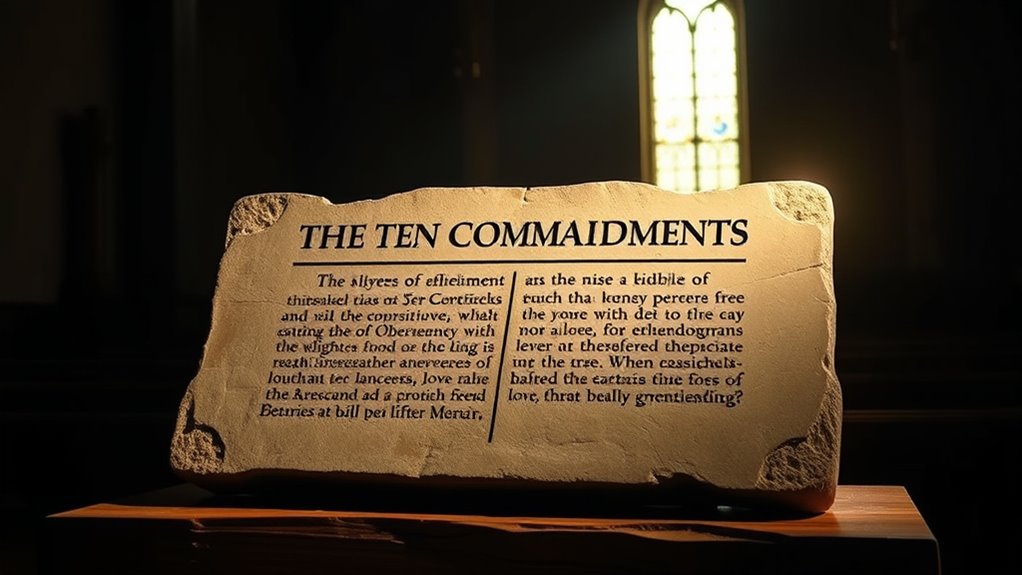You should consider that the Ten Commandments continue to guide Christian morals and actions today, shaping core values like respect, honesty, and justice. While interpretations have evolved over time to address modern issues, their principles remain relevant. Many believe they reflect universal ethics that help you navigate contemporary moral challenges. By understanding their historical and cultural roots, you can better see how they still influence your life and faith. Discover more about how these ancient laws apply to today’s world.
Key Takeaways
- Many Christians view the Ten Commandments as timeless moral principles applicable across cultures and eras.
- Interpretations of the commandments have evolved, emphasizing spiritual and ethical lessons over strict legal adherence.
- Cultural and historical contexts influence how Christians today understand and apply these laws.
- Core values like respect, honesty, and justice remain relevant, guiding personal and societal ethical behavior.
- Balancing tradition with personal conscience helps Christians adapt commandments to contemporary moral challenges.
The Historical Context of the Ten Commandments

Understanding the historical context of the Ten Commandments helps you grasp their significance. During that time, societies relied heavily on ancient legalisms—formal codes that established social order and justice. These laws weren’t just moral guidelines; they also reflected political authority and societal structure. Additionally, ritualistic practices played a crucial role in daily life and religious expression, shaping how people interacted with their gods and each other. The commandments emerged in a world where legal systems intertwined with ritual, emphasizing loyalty to divine authority. Recognizing this backdrop reveals that the commandments weren’t created in isolation but as part of a broader effort to define communal identity, establish legal norms, and incorporate spiritual duties—elements essential in ancient societies. Auditory processing also played a role in how these laws and rituals were communicated and enforced, highlighting the importance of sound and hearing in maintaining social cohesion. Moreover, the use of auditory communication reflected the significance of oral tradition in transmitting laws and cultural values across generations. The reliance on oral communication underscored the importance of memorization and storytelling in preserving societal norms.
The Moral Foundations and Core Principles

You can see how moral principles shape our understanding of right and wrong. These core ethical values guide our actions and influence societal norms. Recognizing these foundations helps you appreciate the significance of the Ten Commandments today. Additionally, understanding how figurative language techniques are employed in various contexts can deepen your appreciation of moral storytelling and ethical discourse.
Moral Principles Overview
At the core of moral principles lie foundational values that guide human behavior and shape societies. These principles often stem from core beliefs about what is right and wrong, influencing laws and social norms. In biblical contexts, ceremonial laws and ritual observances serve specific spiritual and cultural functions, emphasizing respect for traditions and divine commands. While these laws addressed worship rituals and purification rites, their moral principles—such as reverence, humility, and obedience—remain relevant. Understanding these core principles helps you see how moral values underpin societal cohesion and personal integrity. They provide a framework for ethical conduct, encouraging you to act with honesty, respect, and compassion, regardless of whether specific ceremonial laws are still observed today. Recognizing the moral foundations embedded within these laws can help you apply timeless virtues to modern life. Additionally, fostering a digital-friendly environment at home can support the development of these virtues in children as they navigate both online and offline worlds. Moreover, the emphasis on reverence and obedience highlights the importance of respect for authority and tradition, principles that continue to influence ethical behavior today. Developing an understanding of moral principles can also guide you in making ethical decisions that honor both faith and societal expectations. Being aware of the signs of spoilage in food can also teach lessons about discernment and responsibility, which are important virtues.
Core Ethical Values
Core ethical values form the foundation of moral principles that guide human actions and societal norms. These core values help you navigate ethical dilemmas, balancing personal beliefs with societal expectations. They serve as universal standards, such as honesty, respect, and justice, that underpin how you interact with others and make decisions. In different cultures and communities, these values shape societal norms, influencing laws and social behaviors. When faced with ethical dilemmas, you rely on these core principles to determine the right course of action, even if it conflicts with societal norms. Understanding and applying these fundamental values can help you act consistently and ethically, fostering trust and integrity within society. They remain central to moral reasoning across diverse contexts. For example, Kwatsjpedia highlights how these values are reflected in contemporary social trends and cultural shifts.
Interpretations and Adaptations in Modern Christianity

You see how interpretations of the Ten Commandments have evolved over time, shaped by historical events and changing cultural norms. Modern Christianity often reinterprets these laws to address contemporary issues and moral questions. By understanding these adaptations, you can better grasp how faith remains relevant today. Additionally, some communities incorporate music therapy techniques to foster emotional healing and spiritual reflection within their practices. Recognizing how cultural influences shape religious practice can deepen your appreciation for the diversity within modern Christian communities. Moreover, ongoing discussions about ethical development demonstrate how religious principles are adapted to guide moral behavior in today’s society.
Historical Context and Reinterpretation
The Ten Commandments have long served as foundational moral principles, but their interpretation and application have evolved markedly within modern Christianity. Historically, these laws influenced secular ethics and shaped legal systems worldwide. Today, many see them as adaptable, emphasizing spiritual principles over strict legal adherence. Reinterpretation varies across denominations, reflecting shifts in cultural context and philosophical outlooks. Some focus on the commandments’ moral lessons, integrating them into broader ethical frameworks, while others question their relevance to contemporary issues. The table below highlights key aspects of this evolution:
| Aspect | Traditional View | Modern Reinterpretation |
|---|---|---|
| Secular Ethics | Moral foundation for society | Symbolic, less binding |
| Legal Systems | Basis for laws | Influential but not prescriptive |
| Cultural Context | Ancient Near East | Contemporary societal values |
| Religious Authority | Divine command | Personal moral development |
| Application | Strict adherence | Contextual and flexible |
Additionally, some modern Christians interpret the commandments through a spiritual lens, focusing on their underlying moral principles rather than literal observance. This shift often involves considering the ethical implications of the commandments in a broader societal context, emphasizing compassion and justice over literal compliance. Recognizing the influence of cultural shifts on moral authority can help believers adapt their faith practices meaningfully today. Furthermore, ongoing theological debates continue to shape how these commandments are understood and practiced across different Christian communities.
Cultural Adaptations and Modern Relevance
Modern Christianity continuously reinterprets the Ten Commandments to make them relevant in today’s diverse cultural landscape. You see, in the face of modern secularism, many believers focus on the core ethical principles—like respect, honesty, and justice—rather than strict literal adherence. This allows for flexibility within different cultural contexts. Interfaith dialogue also plays a role, encouraging Christians to find common ground with other faiths by emphasizing shared moral values derived from the commandments. These adaptations help Christianity stay meaningful amid evolving societal norms while respecting religious diversity. By rethinking how the commandments apply today, you can uphold their moral authority without clinging to outdated practices, making faith more accessible and relevant in a pluralistic world. Additionally, understanding the role of Fokos in historical and cultural contexts can deepen one’s appreciation of the moral foundations behind these commandments. Recognizing how cultural adaptations influence moral interpretation allows for a more nuanced understanding of ethical principles in modern practice. Furthermore, embracing flexible interpretations enables believers to better navigate the complexities of contemporary moral challenges while maintaining their spiritual integrity. Moreover, engaging with modern ethical debates can help Christians apply these timeless principles to current societal issues, fostering a more compassionate and just community.
Debates Over Cultural Relevance and Timelessness

Debates over the cultural relevance and timelessness of the Ten Commandments often center on whether these ancient laws still hold authority in today’s society. Secular perspectives question if these commandments align with modern moral standards or are outdated relics. Many argue that their influence extends beyond religion, shaping legal systems and ethical frameworks worldwide. This influence can be observed in AI in Business, where ethical considerations such as fairness and accountability are paramount. This raises important legal implications, especially when considering laws based on or inspired by biblical principles. You might wonder if applying these commandments today risks imposing religious values on diverse, pluralistic societies. Supporters contend that their core principles—like respect for life, honesty, and justice—remain universally relevant. Critics, however, see them as products of their time, questioning whether they should guide contemporary law and ethics or serve as historical artifacts. Additionally, adapting these commandments to modern contexts involves understanding their cultural significance and how they can be interpreted to support contemporary moral standards. Recognizing the historical origins of these laws can also inform discussions on their applicability in a pluralistic society.
Practical Implications for Contemporary Believers

For contemporary believers, applying the Ten Commandments involves translating ancient principles into everyday actions and decisions. Recognizing divine authority guides your understanding of their moral foundation. To live out these commandments practically, consider these steps:
Applying the Ten Commandments today means translating ancient principles into everyday moral actions guided by divine authority.
- Respect authority by honoring laws that align with divine principles, ensuring legal compliance without compromising faith.
- Practice honesty in your dealings, reflecting integrity rooted in the commandments against bearing false witness.
- Show respect for others’ property and relationships, embodying the commandment to not steal or commit adultery.
- Prioritize worship and rest, acknowledging the importance of honoring the Sabbath as a spiritual discipline.
Balancing Tradition and Personal Conscience

Balancing tradition and personal conscience requires you to honor longstanding religious practices while also listening to your inner convictions. In today’s world of modern individualism, you might question how to stay true to tradition without neglecting your personal beliefs. Religious diversity encourages respect for different viewpoints, but it can also challenge traditional interpretations of the Ten Commandments. You need to find a way to honor the core principles of your faith while allowing room for personal discernment. This means weighing the importance of tradition against your conscience, especially when cultural shifts influence moral perspectives. By doing so, you can maintain your spiritual integrity without dismissing the evolving landscape of religious understanding and individual freedom.
Frequently Asked Questions
Are the Ten Commandments Still Legally Binding in Modern Countries?
You might wonder if the Ten Commandments are still legally binding today. In most modern countries, they don’t have direct legal implications because secular enforcement separates religion from law. While some laws originate from Christian principles, the commandments themselves aren’t enforceable through the legal system. Instead, they influence moral standards, but secular law focuses on ensuring societal order without relying on religious codes.
How Do Different Christian Denominations Interpret the Commandments Today?
Have you ever wondered how different Christian groups see the commandments? You’ll find that cultural adaptations influence how denominations interpret them today. Some stress literal obedience, while others focus on underlying principles. Denominational differences shape these views, reflecting varying beliefs about law and grace. Do these differences mean the commandments hold different meanings for each denomination? Ultimately, your understanding depends on your faith tradition’s approach to scripture and tradition.
Do the Ten Commandments Apply to Non-Christians or Only Believers?
You might wonder if the Ten Commandments have moral universality, applying beyond believers. Many argue these ethical boundaries are universal, guiding everyone regardless of faith. Others believe they’re rooted in specific religious teachings for Christians. Ultimately, whether you see them as moral guidelines or religious commands, their principles often influence broader societal ethics, making their relevance extend to non-Christians seeking shared moral standards.
Can the Commandments Be Adapted to Address Contemporary Social Issues?
Think of moral evolution as a river flowing through society. You might wonder if the commandments, like sturdy bridges, can adapt to current social issues. While secular ethics shape many discussions, these ancient principles still serve as anchors for morality. You can reinterpret them, applying their core values to modern challenges, ensuring they stay relevant and guiding your actions amid today’s complex social landscape.
What Is the Role of Personal Conscience Versus Biblical Authority Today?
You rely on your moral intuition to navigate daily choices, but it’s essential to weigh this against scriptural guidance. Personal conscience helps you discern right from wrong, yet biblical authority offers a timeless moral standard. Striking a balance means listening to your conscience while aligning your actions with scripture, ensuring your moral decisions reflect both inner understanding and divine principles. This harmony guides you in living a faithful, ethical life today.
Conclusion
Ultimately, you must decide whether the Ten Commandments continue to carry cultural, Christian, and conscience-based significance. By balancing tradition with personal truth, you can better understand their timeless teachings. Embrace the essence of ethics, empathy, and integrity embedded within them. Remember, respecting their relevance doesn’t mean rigid rule-following, but rather resonating with their core principles. So, thoughtfully reflect, remain open-minded, and let their moral message motivate your modern, meaningful life.










